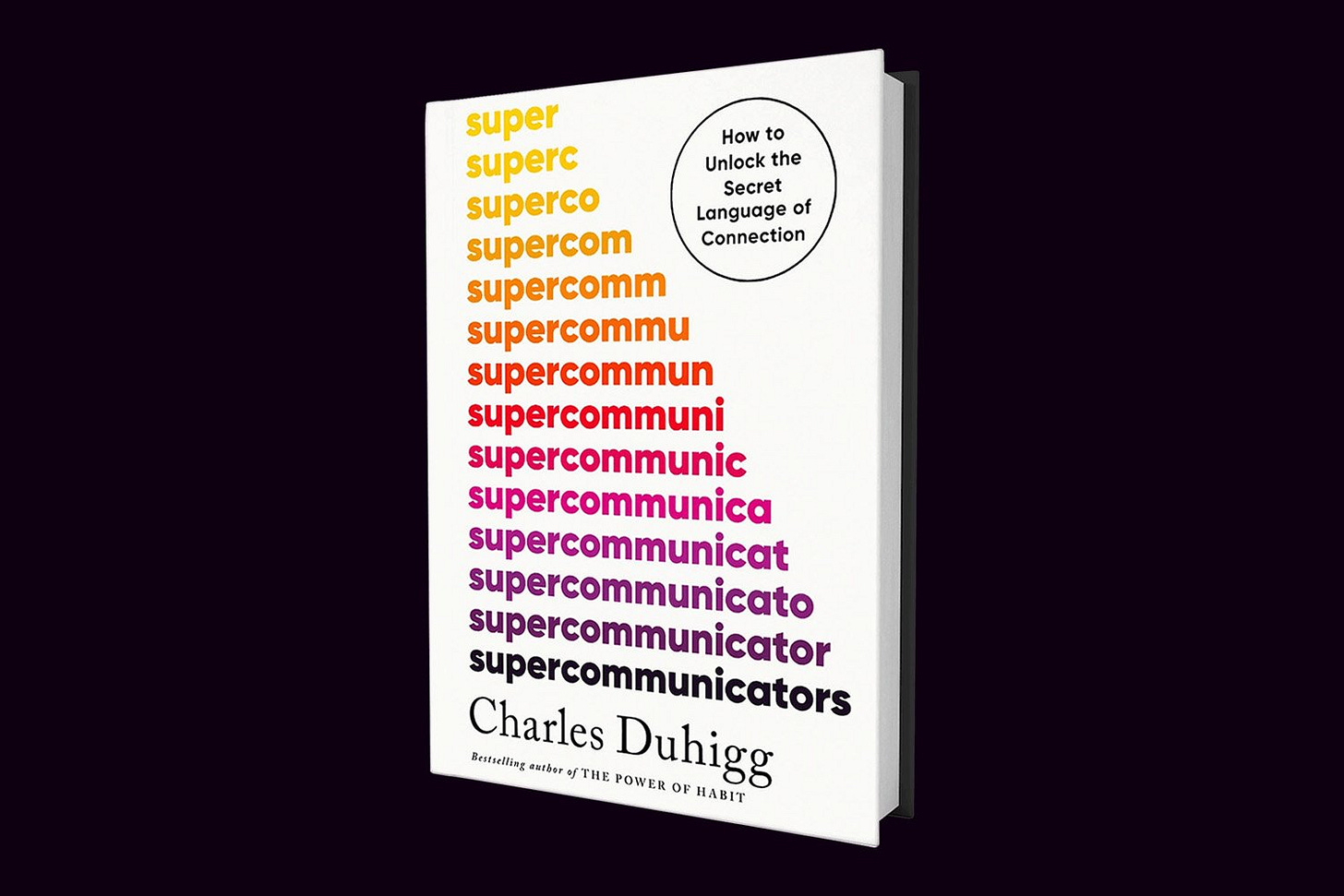The power of Supercommunicators
Writer Charles Duhigg explores the transformative power of effective communication
Supercommunicators: How to Unlock the Secret Language of Connection
By Charles Duhigg
Grade: 96
I’ve been reading Charles Duhigg’s work for well over a decade. And though it would be impossible to pick a favorite from among his books, The Power of Habit: The Transformative Power of real Productivity is in the top 10 of most impactful books I’ve read. Ever. For real. His simple, research-backed breakdown of how habits are formed (cue-reward-routine) was the eye-opener I needed to understand how to break bad habits. With Supercommunicators: How to Unlock the Secret Language of Connection, he invites readers on a journey through the labyrinthine world of effective communication.
The purpose of the book
Duhigg's goal with Supercommunicators is to equip readers with the ability to become masters of the subtle art of connection. At the heart of this effort are what he calls “The Three Conversations,” a framework he breaks communication down into its constituent layers: “practical (What’s this really about?), emotional (How do we feel?), and social (Who are we?).” These conversations help shape our relationships, decisions, and understanding of the world.
“The emotional conversations where I talk about my feelings. There are practical conversations where we might talk about how to solve a problem or how to plan for the future. And then there's social conversations, which is about how we relate to each other and the social identities that are important to us.”
Who are supercommunicators?
Supercommunicators are who we should all aspire to be in our daily conversations. They uplift everyone’s spirits, defuse conflicts, and nudge us toward perspectives we might never have otherwise considered. Whether navigating contentious debates or charming strangers at parties, they excel at drawing people in and leave them feeling good about the interaction.
What sets them apart, however, is their mastery of the subtle dance of empathy, active listening, and emotional intelligence. They decode unspoken cues, are attuned to others’ needs, and adapt their language accordingly. Their secret lies in understanding that communication isn’t about broadcasting; it’s about receiving, interpreting, and responding.
Duhigg contends that they are adept at active listening, deciphering the unspoken messages that linger between the lines, and they are courageous at embracing vulnerability, which sets them apart in a in a world filled with superficial chatter.
Why I loved the book
Whenever I’m reading a book, three thoughts go through my head at some point during the hours it takes to finish each tome:
Would I be missing something if I didn't have the knowledge obtained from the book?
How immediately useful is the information I’m learning?
Are there at least three memorable nuggets I’ll walk away with?
With Supercommunicators, the answers were yes, yes, and yes. In fact, two of the passages he shared in the book nailed all three of the listed elements.
The physician supercommunicator
One was of a NY-based cancer surgeon who used to consult with prostate-cancer patients by sharing data about the outcomes linked to surgery versus having no surgery at all. He noticed that the terrified patients responded by telling stories about family members or friends. The decisions were personal and emotional, not logical, he realized.
He then realized that a better approach was to begin the consultations with open-ended questions. What did cancer mean to a patient? What mattered most? By doing so, he was inviting the patients to open up and they could engage in meaningful dialogue. Through a process of what he called “quiet negotiation,” he noticed a significant improvement in his patient’s information gathering and decision making. With the starting point of emotions, feelings, he had an open door to nudge patients toward rational decision-making.
Unconscious bias training does more harm than good
Another example that was hard to forget was his citing of recent research on workplace unconscious bias training. The results ranged from useless to harmful, he said. Far from encouraging the mutual understanding that underpins productive conversations, such training makes people defensive, unfairly lumps everyone into groups, and burdens them with insulting assumptions. In fact, organizations who adopt such training typically see decreased advancement of minorities, especially Black men and women.
Having talked to people who’ve undergone such training, I was not at all surprised at the findings from the research. Training of the sort is anathema to the results it purports to promote, in part because it provokes a level of discomfort that makes it hard for people to meaningfully disconnect. After all, as individuals, it’s hard to focus on how different we are and invite sincere, honest dialogue.
Who should read Supercommunicators?
Duhigg is an excellent writer and storyteller who, thankfully for readers, adeptly tackles timely issues with thought-provoking, entertaining prose. Anyone looking to be a better communicator and build stronger bonds while doing so should read Supercommunicators.


